Donghua Zhou
InspecSafe-V1: A Multimodal Benchmark for Safety Assessment in Industrial Inspection Scenarios
Jan 29, 2026Abstract:With the rapid development of industrial intelligence and unmanned inspection, reliable perception and safety assessment for AI systems in complex and dynamic industrial sites has become a key bottleneck for deploying predictive maintenance and autonomous inspection. Most public datasets remain limited by simulated data sources, single-modality sensing, or the absence of fine-grained object-level annotations, which prevents robust scene understanding and multimodal safety reasoning for industrial foundation models. To address these limitations, InspecSafe-V1 is released as the first multimodal benchmark dataset for industrial inspection safety assessment that is collected from routine operations of real inspection robots in real-world environments. InspecSafe-V1 covers five representative industrial scenarios, including tunnels, power facilities, sintering equipment, oil and gas petrochemical plants, and coal conveyor trestles. The dataset is constructed from 41 wheeled and rail-mounted inspection robots operating at 2,239 valid inspection sites, yielding 5,013 inspection instances. For each instance, pixel-level segmentation annotations are provided for key objects in visible-spectrum images. In addition, a semantic scene description and a corresponding safety level label are provided according to practical inspection tasks. Seven synchronized sensing modalities are further included, including infrared video, audio, depth point clouds, radar point clouds, gas measurements, temperature, and humidity, to support multimodal anomaly recognition, cross-modal fusion, and comprehensive safety assessment in industrial environments.
Continual learning-based probabilistic slow feature analysis for multimode dynamic process monitoring
Feb 23, 2022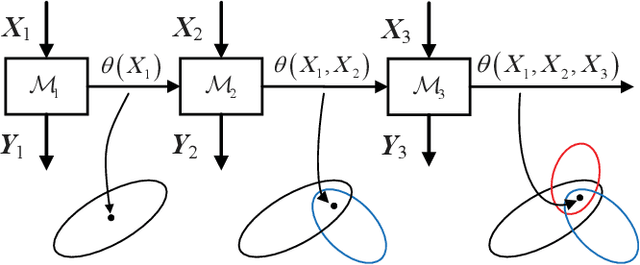
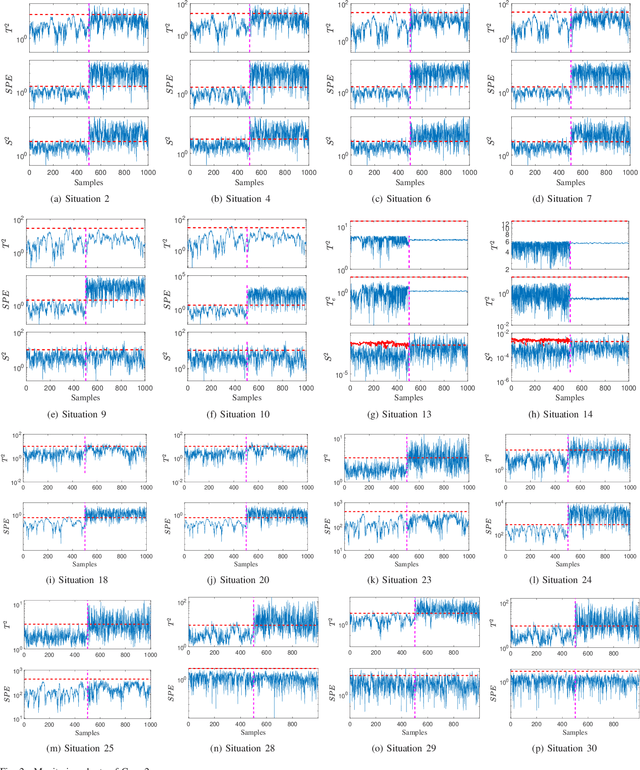
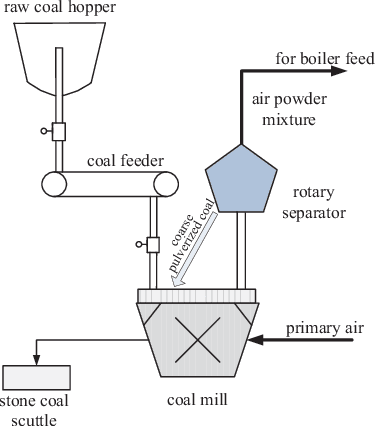
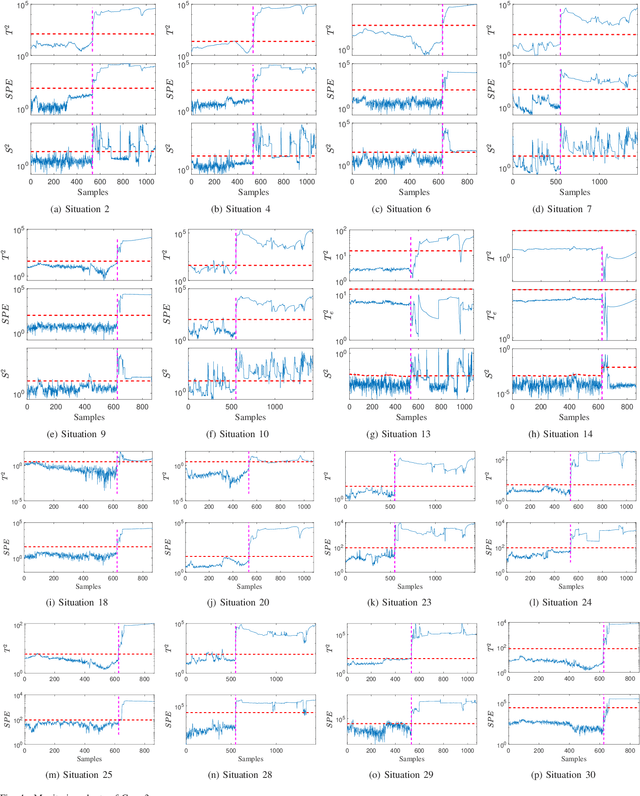
Abstract:In this paper, a novel multimode dynamic process monitoring approach is proposed by extending elastic weight consolidation (EWC) to probabilistic slow feature analysis (PSFA) in order to extract multimode slow features for online monitoring. EWC was originally introduced in the setting of machine learning of sequential multi-tasks with the aim of avoiding catastrophic forgetting issue, which equally poses as a major challenge in multimode dynamic process monitoring. When a new mode arrives, a set of data should be collected so that this mode can be identified by PSFA and prior knowledge. Then, a regularization term is introduced to prevent new data from significantly interfering with the learned knowledge, where the parameter importance measures are estimated. The proposed method is denoted as PSFA-EWC, which is updated continually and capable of achieving excellent performance for successive modes. Different from traditional multimode monitoring algorithms, PSFA-EWC furnishes backward and forward transfer ability. The significant features of previous modes are retained while consolidating new information, which may contribute to learning new relevant modes. Compared with several known methods, the effectiveness of the proposed method is demonstrated via a continuous stirred tank heater and a practical coal pulverizing system.
Self-learning sparse PCA for multimode process monitoring
Aug 07, 2021

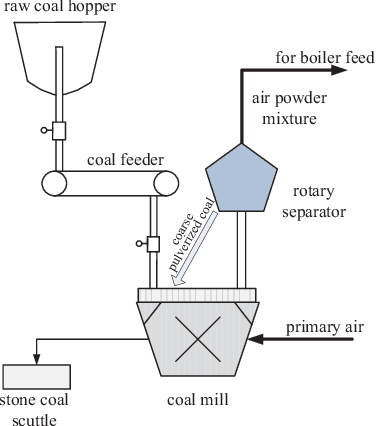
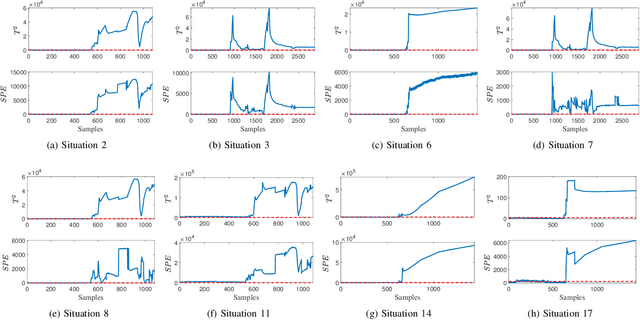
Abstract:This paper proposes a novel sparse principal component analysis algorithm with self-learning ability for successive modes, where synaptic intelligence is employed to measure the importance of variables and a regularization term is added to preserve the learned knowledge of previous modes. Different from traditional multimode monitoring methods, the monitoring model is updated based on the current model and new data when a new mode arrives, thus delivering prominent performance for sequential modes. Besides, the computation and storage resources are saved in the long run, because it is not necessary to retrain the model from scratch frequently and store data from previous modes. More importantly, the model furnishes excellent interpretability owing to the sparsity of parameters. Finally, a numerical case and a practical pulverizing system are adopted to illustrate the effectiveness of the proposed algorithm.
Monitoring nonstationary processes based on recursive cointegration analysis and elastic weight consolidation
Jan 21, 2021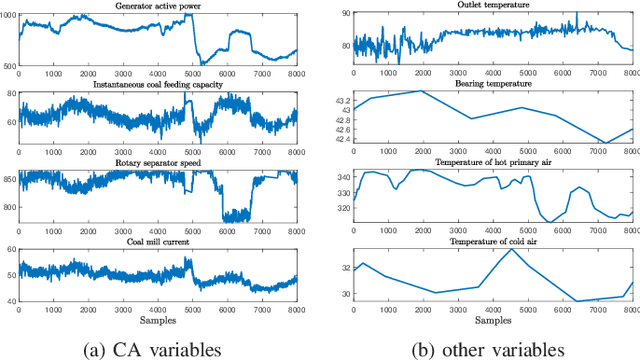
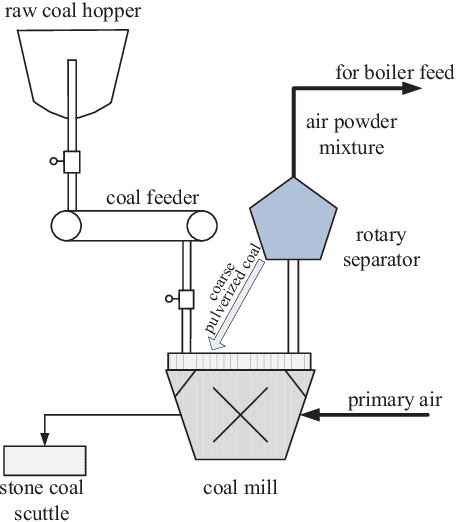
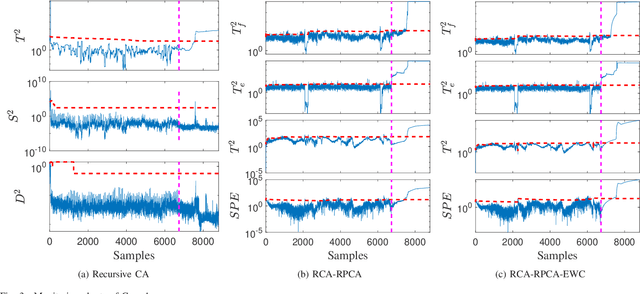
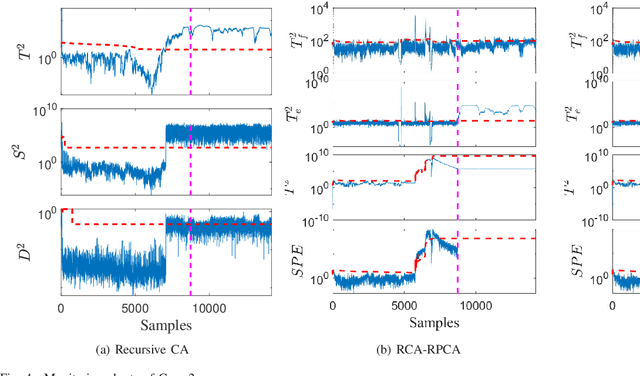
Abstract:This paper considers the problem of nonstationary process monitoring under frequently varying operating conditions. Traditional approaches generally misidentify the normal dynamic deviations as faults and thus lead to high false alarms. Besides, they generally consider single relatively steady operating condition and suffer from the catastrophic forgetting issue when learning successive operating conditions. In this paper, recursive cointegration analysis (RCA) is first proposed to distinguish the real faults from normal systems changes, where the model is updated once a new normal sample arrives and can adapt to slow change of cointegration relationship. Based on the long-term equilibrium information extracted by RCA, the remaining short-term dynamic information is monitored by recursive principal component analysis (RPCA). Thus a comprehensive monitoring framework is built. When the system enters a new operating condition, the RCA-RPCA model is rebuilt to deal with the new condition. Meanwhile, elastic weight consolidation (EWC) is employed to settle the `catastrophic forgetting' issue inherent in RPCA, where significant information of influential parameters is enhanced to avoid the abrupt performance degradation for similar modes. The effectiveness of the proposed method is illustrated by a practical industrial system.
Monitoring multimode processes: a modified PCA algorithm with continual learning ability
Dec 28, 2020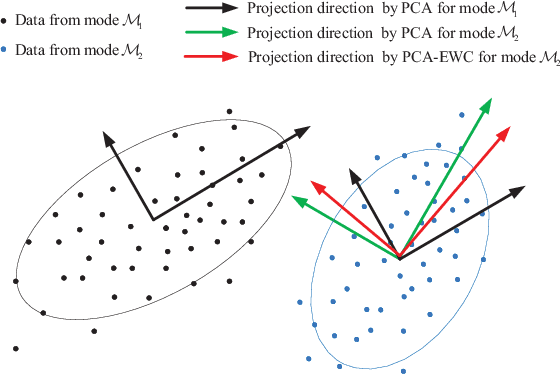
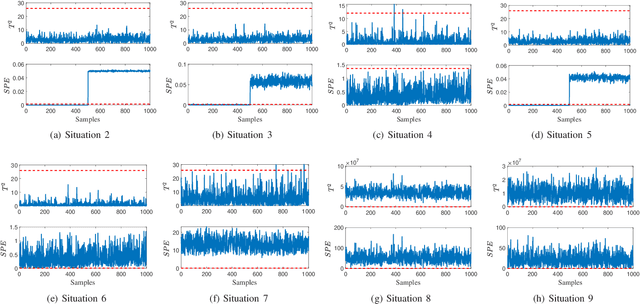
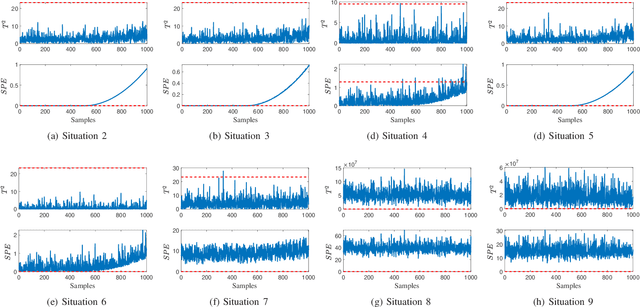
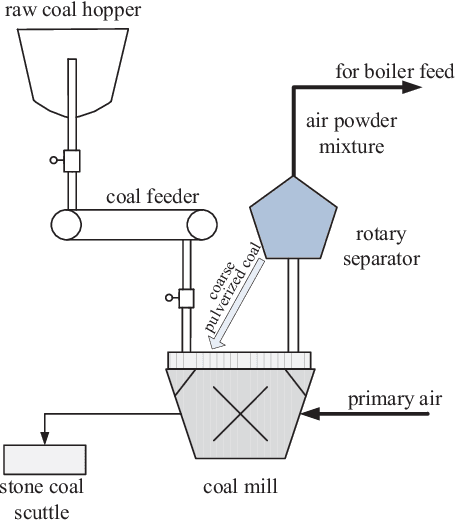
Abstract:For multimode processes, one has to establish local monitoring models corresponding to local modes. However, the significant features of previous modes may be catastrophically forgotten when a monitoring model for the current mode is built. It would result in an abrupt performance decrease. Is it possible to make local monitoring model remember the features of previous modes? Choosing the principal component analysis (PCA) as a basic monitoring model, we try to resolve this problem. A modified PCA algorithm is built with continual learning ability for monitoring multimode processes, which adopts elastic weight consolidation (EWC) to overcome catastrophic forgetting of PCA for successive modes. It is called PCA-EWC, where the significant features of previous modes are preserved when a PCA model is established for the current mode. The computational complexity and key parameters are discussed to further understand the relationship between PCA and the proposed algorithm. Numerical case study and a practical industrial system in China are employed to illustrate the effectiveness of the proposed algorithm.
Process monitoring based on orthogonal locality preserving projection with maximum likelihood estimation
Dec 13, 2020


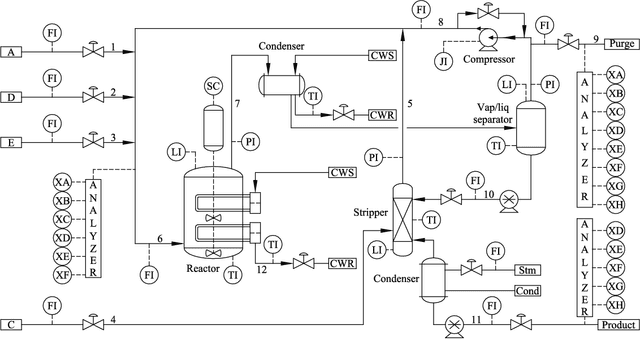
Abstract:By integrating two powerful methods of density reduction and intrinsic dimensionality estimation, a new data-driven method, referred to as OLPP-MLE (orthogonal locality preserving projection-maximum likelihood estimation), is introduced for process monitoring. OLPP is utilized for dimensionality reduction, which provides better locality preserving power than locality preserving projection. Then, the MLE is adopted to estimate intrinsic dimensionality of OLPP. Within the proposed OLPP-MLE, two new static measures for fault detection $T_{\scriptscriptstyle {OLPP}}^2$ and ${\rm SPE}_{\scriptscriptstyle {OLPP}}$ are defined. In order to reduce algorithm complexity and ignore data distribution, kernel density estimation is employed to compute thresholds for fault diagnosis. The effectiveness of the proposed method is demonstrated by three case studies.
 Add to Chrome
Add to Chrome Add to Firefox
Add to Firefox Add to Edge
Add to Edge